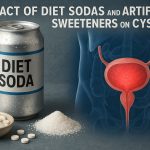The seemingly simple question of whether diet soda can be a trigger – for anything from headaches and digestive issues to more complex conditions like migraines and even weight gain – is surprisingly nuanced. For decades, artificial sweeteners were marketed as a guilt-free alternative to sugar, allowing people to enjoy sweet beverages without the caloric consequences. However, emerging research and anecdotal evidence are challenging this narrative, suggesting that these substitutes might not be entirely benign. Many individuals report experiencing noticeable physical or psychological effects after consuming diet soda, prompting a growing curiosity about its potential role as a hidden trigger in various health concerns.
The difficulty lies in untangling the complex interplay between individual sensitivities, dietary habits, and the biochemical effects of artificial sweeteners. What impacts one person might have no effect on another, making it challenging to establish definitive conclusions. Furthermore, the “nocebo effect” – where negative expectations lead to negative experiences – can play a significant role in how people perceive their symptoms after consuming diet soda. This doesn’t invalidate individual experiences; rather, it highlights the need for careful investigation and personalized approaches to understanding the potential triggers behind health issues. The following explores some of the current understandings surrounding this topic, examining both scientific findings and common anecdotal reports.
Artificial Sweeteners & Potential Sensitivities
Artificial sweeteners are designed to be far sweeter than sugar, allowing manufacturers to use only tiny amounts in food and beverages. This is often cited as a benefit – fewer calories, less impact on blood sugar levels. However, this intense sweetness can also disrupt our natural taste perception and potentially alter the gut microbiome. The most common artificial sweeteners found in diet soda include aspartame, sucralose, saccharin, and acesulfame potassium (Ace-K). Each has its own unique chemical structure and potential effects on the body. Aspartame, for example, breaks down into phenylalanine, methanol, and formaldehyde within the body. While these compounds are generally present in small amounts, some individuals may be more sensitive to them than others.
Sucralose, marketed as Splenda, is derived from sugar but isn’t metabolized by the body – meaning it passes through largely unchanged. This has led to concerns about its potential impact on gut bacteria, as it’s not a food source for beneficial microbes. Saccharin and Ace-K have also been linked to alterations in the gut microbiome in some studies. A disrupted gut microbiome can contribute to various health problems, including digestive issues, inflammation, and even mood disorders. It’s important to note that research on the long-term effects of artificial sweeteners is ongoing, and more definitive evidence is needed to fully understand their impact on human health. The idea isn’t necessarily about toxicity, but rather sensitivity – how a person’s body specifically reacts to these compounds.
Furthermore, individuals with pre-existing conditions or sensitivities may be particularly vulnerable to the effects of artificial sweeteners. For instance, people with irritable bowel syndrome (IBS) often report increased symptoms after consuming artificially sweetened products, potentially due to the impact on gut motility and fermentation processes. Similarly, those prone to migraines may find that certain artificial sweeteners can act as triggers, although the exact mechanisms are still being investigated. The variability in individual responses underscores the importance of self-awareness and personalized dietary adjustments. If you experience persistent issues, it might be helpful to understand if can urethral pain be a hormonal issue.
Diet Soda & Reported Trigger Effects
Beyond broad sensitivity concerns, many individuals report specific symptoms triggered by diet soda consumption. Headaches, including migraines, are among the most commonly cited effects. While studies have yielded mixed results – some finding no correlation, others suggesting a potential link – anecdotal evidence is strong. The proposed mechanisms vary, ranging from changes in blood flow to the brain caused by certain artificial sweeteners to the disruption of neurotransmitter balance. Digestive issues, such as bloating, gas, and diarrhea, are also frequently reported. As mentioned previously, this could be related to alterations in the gut microbiome or increased fermentation due to undigested sweeteners.
Some individuals even report experiencing psychological effects after consuming diet soda, including mood swings, anxiety, or difficulty concentrating. This could be linked to the impact of artificial sweeteners on brain chemistry or simply a result of the association between diet soda and negative health perceptions. Interestingly, some people report experiencing withdrawal symptoms when they attempt to eliminate diet soda from their diet, further suggesting that it can become a habit-forming substance – not necessarily in an addictive sense, but rather through psychological dependence. It’s crucial to differentiate between correlation and causation here; just because someone experiences a symptom after drinking diet soda doesn’t automatically mean the diet soda caused the symptom. However, consistent patterns of reported effects warrant further investigation and individual attention. Can incontinence be a warning sign should also be considered if digestive issues are present.
Identifying Potential Triggers
The first step in determining if diet soda is a trigger for you is careful observation and tracking. – Keep a detailed food diary: Record everything you eat and drink, including the specific type of artificial sweetener used in any products consumed. – Note associated symptoms: Log any physical or psychological changes you experience after consuming diet soda, such as headaches, digestive issues, mood swings, or fatigue. Be specific about the timing, severity, and duration of these symptoms. – Eliminate for a period: Consider eliminating all diet soda from your diet for at least two weeks to see if your symptoms improve. This is often referred to as an elimination diet. – Reintroduce cautiously: After the elimination phase, reintroduce diet soda gradually and observe any changes in your symptoms. Start with a small amount and increase it slowly to identify potential thresholds.
This process allows you to establish a clear link between diet soda consumption and your symptoms. It’s also helpful to consider other potential triggers simultaneously, such as stress, sleep deprivation, or other dietary factors. If you suspect that diet soda is contributing to your health concerns, consult with a healthcare professional or registered dietitian for personalized guidance. They can help you develop a tailored plan to identify and manage your specific triggers. How subtle dripping can be a warning sign is another symptom that should prompt medical evaluation, if present.
The Role of the Gut Microbiome
The gut microbiome plays an increasingly recognized role in overall health and well-being. Artificial sweeteners have been shown to alter the composition and function of this microbial ecosystem, potentially leading to dysbiosis – an imbalance in gut bacteria. This can manifest in various ways, including impaired digestion, weakened immune function, and increased inflammation. Some studies suggest that sucralose, for instance, may reduce the number of beneficial bacteria while promoting the growth of potentially harmful ones.
A disrupted gut microbiome can also contribute to leaky gut syndrome, where the intestinal barrier becomes more permeable, allowing undigested food particles and toxins to enter the bloodstream. This can trigger an immune response and exacerbate inflammation throughout the body. Furthermore, alterations in the gut microbiome have been linked to mood disorders and cognitive dysfunction, highlighting the intricate connection between gut health and brain function. Addressing gut health through dietary changes, such as incorporating probiotic-rich foods and reducing artificial sweetener intake, may help mitigate some of these effects.
Exploring Alternatives & Mitigation Strategies
If you suspect that diet soda is a trigger for your symptoms, there are several alternatives you can explore. – Water: The most fundamental and often overlooked option! Staying adequately hydrated is crucial for overall health. – Herbal teas: Offer a variety of flavors and potential health benefits without artificial sweeteners. – Sparkling water with fruit slices: Provides a refreshing alternative to diet soda while adding natural flavor. – Naturally sweetened beverages: Look for options sweetened with small amounts of honey, maple syrup, or stevia (a natural sweetener derived from the stevia plant). However, even these should be consumed in moderation.
If you choose to continue consuming diet soda, there are strategies you can employ to mitigate potential negative effects. – Limit intake: Reducing your consumption can help minimize exposure to artificial sweeteners. – Choose different sweeteners: Experiment with different types of artificially sweetened products to see if certain sweeteners trigger symptoms less frequently than others. – Pair with food: Consuming diet soda with a meal may slow down absorption and reduce the impact on blood sugar levels. – Support gut health: Incorporating probiotic-rich foods, such as yogurt, kefir, and fermented vegetables, can help maintain a healthy gut microbiome. Ultimately, understanding your individual sensitivities and making informed choices about your dietary habits is key to managing potential triggers and optimizing your overall well-being.





















